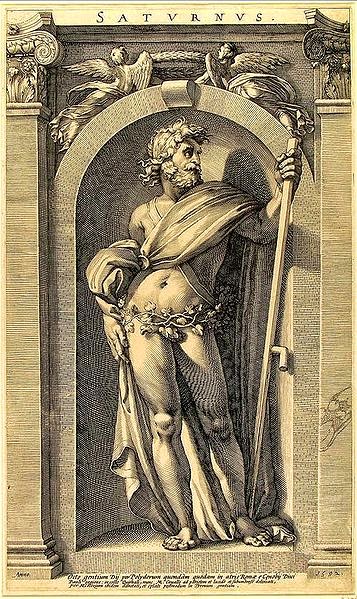Astrologer's Tip: Insights into Saturn from 1687 by Richard Kirby
 |
| 16th-century engraving of Saturnus |
Saturn
This old furly Gentleman, whom we call Saturn belongs to the seventh Orb, Mansion or Sphere, of the celestial Hierarchy of Angels, in the order of the Thrones, whose principal governing Angels or blessed Intelligences, bearing Rule, are Cassel, or Zaphkiel, Jophiel and Sabathiel.
He is said to be by Nature cold and dry, the Author of melancholy, masculine, diurnal, barren and the greater infortune.
Secondly Saturn of himself gives a person of a middle stature, of a swarthy complexion, pale and muddy, as he is nearer or farther from the Earth, he also gives little eyes, and black; a thin beard, flat broad forehead, black or sad hair, lank hard and rugged; a hanging low-ring eyebrow, thick lips and nose, a lumpish countenance, thick shoulders, often times crooked, a lean face, a shuffling kind of gate, and for the most part splay footed, and delights to be alone, and is always prying up and down in one hole or other; sometimes he hits one leg against the other, and commonly looks downwards.
When Saturn is ill placed
He makes men very willful, malicious, covetous, envious, jealous and mistrustful; also timorous, sordid, stubborn, suspicious, sluggish, dissembling, a great lyer, and a close malicious fellow, never contented, but perpetually murmuring and repining, always contemning of women, and speaking ill of them, Saturn gives a color of black.
Thirdly, When Saturn is or shall be well-dignified then he gives Men of profound judgments and imaginations, but severe in all their Acts, and men of reserved thoughts, speaking very sparingly, patient in arguing or disputing, very sober and grave; he also gives great students in all manner of learning, especially those things which are most occult; and are very laborious in obtaining the goods of this lower World; and in all manner of Action austere, yet solicitous enough.
Fourthly, If Saturn be oriental of the Sun, he makes men more short of stature, but decent and well composed.
Fifthly, If Saturn be occidental of the Sun, he makes them more black and lean, and fewer hair, especially he hw want latitude.
Sixthly, If Saturn have fourth latitude the person is more nimble and active, his greatest south latitude is 2gr. 49m.
Seventhly, If Saturn have north latitude, he makes the person more sluggish and heavy, his greater north latitude is 2 gr. 28 m.
Eightly, If Saturn have great latitude; the body is fat and fleshy, and you must note, that south latitude gives most flash, and north latitude most hair, yet fleshy also
Ninthly, If Saturn be in his first station, he gives but little fat, but if he be in his second station from the Sun's Body, he gives fat ill favored bodies and very weak.
Tently, Now you must note that Saturn is called amongst the Poets by several Names, (vis) as Chronos, Phanon, and Falciser
Eleventhly, Saturn's greater years are 57; his mean years 43, and his least years 30: He rules the North, being according to his own Nature cold.
Twelvethly, Qualities and Professions of Men under Saturn are generally ancient men, fathers, grandfathers, monks, jesuits, friars, jews, sectaries, husband-men, clowns, day labourers, sexstones, diggers of mettal, stone, cutters, potters, userers, sextones of Churches, diggers of earth, beggers, slaves, hoggards, cow-keepers, curriers of leather, night farmers, tinners, plummers, miners under ground, broommen, porters, car-men, brick-makers, malsters, chimneysweepers, bearers of dead corps, seavengers, hostlers, ditchers, shippards, dyers of black cloth and sad colors, chandlers, herds-men, or awinyards, coopers, black-smiths, leather dressers, hat-makers, farmers, plough-men and the like as collyers.
Thirteenthly, Saturn denotes places out of houses, woods, deserts, obscure vallies, caves, dens, holes, lones, by-allies, mountains, cole-mines, church-yards or places of burial, stinking muddy places, and where rubbish and dung is layed, also houses not inhabited, old tattering obscure dreadful houses, monastries, pits, standing pools, fens, fish-ponds, religious places, lead-mines, and quarries of stone.
Fourteenthly, Saturn in houses denotes dark places, or same by part of the house seldome used, also jakes, vaults, sinks, wells, pitts, durty muddy stinking places, or in those parts where the country mans working geer, or horse harness lyeth; all ruinous buildings, and old decayed parts of the house where people seldome come, he also denotes Tombs, and the like.
Fifteenthly, Kingdoms and countries under the Planet Saturn in Capricorn according to great Ptolemy, are as followeth; Macedonai, Thrace, Illyria, India, Arriana, Gordinia may of which countries are in lesser Asia.
Sixteenthly, Saturn rules in the body of Man, the spleen (and there he keeps his Court) the right ear, the bones, the teeth, the retentive faculty throughout the whole Body.
Seventheenthly, Diseases under Saturn are Tooth-ache, quartane agues, all diseases which come of melancholy, cold and dryness, leprosy, rhymes, consumptions, black jaundise, palsie, trembling, vain fears, formidable fancies of hobgoblings, gouts of all sorts, hemorrhoids, broken bones, laxations and dislocations, deafness, pain in the bones, ruptures, iliack passion, chin-cough, pain in the bladder, all long deseases, and madness that comes of melancholy, fear or grief; he also gives costiveness, and corrupts the blood by melancholy.
A few Instructions to the deserving, would I willingly give, if I thought they would be kindly accepted which take as followeth; as thus,
Take notice a Planet can fetch diseases two ways; first by Sympathy; secondly by Antipathy, and as the cause is so ought the cure to be; for Saturn causeth tooth-ache, broken bones, dislocations, laxations, deafness, melancholy, and all diseases of the spleen by Sympathy, and the reason is because he ruleth the retentive faculty throughout the whole Body.
The parts of the Body which are under the dominition of the Sun and Moon he afflicts by Antipathy, and you shall know what they are immediately, if you will have but a little Patience; and take notice of this, it is the greatest wisdom of a Physician to know whether Saturn causeth the disease by Sympathy, or Antipathy.
Lastly, You must note, that Saturn hath certain Numbers attributed to him as 2,7, and 9. Reasons are as followeth, you must understand he hath the number 2 alloted him as being next beneath the Starry Firmament and also one of the Infortunes; the number 7 he being the seventh in order, and highest of all the Planets from the Earth; 7 also is a number fatal and climacterical, being joyned with the number 9; also number 9 is a fatal number and climacterical being joyned with the number 7; for 9 times 7 makes 68, which is the wisest of Philosophers do hold to be fatal by reason the Nines and the Sevens meet; I now must leave Saturn and descend a little lower to that Benevolent Star Jupiter.
About the author:
Kirby, Richard (1649-1693?), astrologer and medical practitioner, was born on 13 July 1649 of unknown parentage. In an early work he apologized for his mean education. Henry Coley (1633-1704), a close friend, was probably his astrological teacher.
His early works, ephemerides for 1681 and 1682 and an almanac for 1684, were uncontroversial but Kirby became notorious in the mid-1680s when he responded to the threat from popery and absolutism at home and the French and Ottomans abroad by predicting sensational changes throughout Europe. His Vates astrologicus (1683) promised the death of Louis XIV, the devastation of France, Italy, and Spain and the overthrow of the papacy, before the rise of a great conqueror in 1699 who would bring peace to the whole world. Many of these prophecies were drawn from John Holwell's Catastrophe mundi, or from the astrological works of Richard Edlin and William Lilly. Kirby found it expedient to withdraw from London in 1687, and was denounced by the tory astrologer John Gadbury in 1688.
He was able to speak out freely once more after the revolution of 1688, and published Catastrophe Galliae in 1690, in which he promised the conquest of France and Ireland and a golden age of freedom for Britain, and mocked Gadbury for predicting that the year 1688 would pass uneventfully.
In 1681 Kirby was living in Fulham, but he worked from an address in London, advertising his services as teacher and consultant at the sign of the Iron-Jack, a smith's shop in Fetter Lane. Kirby attended from Monday to Wednesday, his partner Philip Mayle on the other days. Like several whig astrologers, Kirby wished to reform astrology by restoring its original purity, a cause championed by the Italian Ptolemaist, Placidus de Titis.
In 1687 he and his friend John Bishop published The Marrow of Astrology, offering a Ptolemaic account of the zodiacal signs and the planets based on Placidus's work. Kirby's section was dedicated to Elias Ashmole, Bishop's to Robert Boyle. Their partnership foundered when Bishop tried to claim sole credit for the work. By this date Kirby had moved to King Street, Soho, at the sign of the Figura Mundi, complaining that the Fulham rabble had abused him as a witch or atheist.
It is possible but unproven that he was the Mr Richard Kirby tried for murder at the Old Bailey in 1687 after a brawl at a gambling house in St Bride's, and acquitted on a plea of self-defence. He was still lodging in King Street when he published his last work in 1693, an account of a fourteen-year-old hysteric or epileptic, Sarah Bower of Wapping. She claimed to be possessed by the devil and the case attracted widespread interest. Kirby saw her on 19 November 1693 and used his account to advertise his success in curing bewitched patients in Norfolk and Suffolk (possibly during his retreat from London in 1687). He promised further details in a book then almost complete; as no such work is known, he probably did not live to finish it. The exact date of his death is unknown, but nothing is heard of him after 1693.
Note: This was quickly typed as it only exists in an image scan pdf online which is difficult to read. In the spirit of getting these old texts and their excellent information online and search engine and reader friendly... and most of all for free, we've taken the time to type them out. If there are typos and such please use the comment section below so we can correct them (take into consideration spelling was different centuries ago. Please feel free to use the comment section to discuss these excerpts.

.jpg)

Comments
Post a Comment